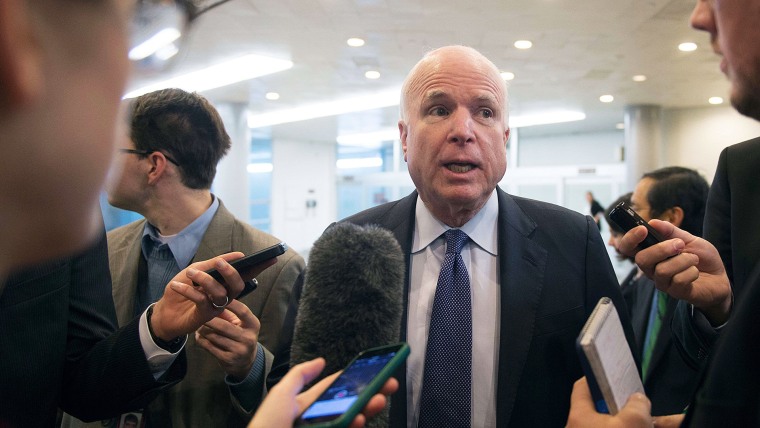JOHN MCCAIN: I blame some of the old veterans' service organizations like the Veterans of Foreign Wars and the Disabled American Veterans and American Legion. They are against the Choice Card. Why would they be against the Choice Card MEGHAN MCCAIN: Why are they against it? JOHN MCCAIN: They have been co-opted by that system. They have this symbiotic relationship with the VA bureaucracy. For them to say they are against a veteran having a choice to me is unconscionable.
While advocates see expanding the program as a way to provide veterans with more options, the groups -- including The American Legion, the Veterans of Foreign Wars, the Disabled American Veterans and Paralyzed Veterans of America -- say it would lead to a fraying and shrinking of an integrated managed care system they say serves veterans best. "The American Legion appreciates Senator McCain's efforts to improve the provision of health care for America's veterans. However, one of the central, core elements of the bill expands care in the community in a way that is concerning," Lou Celli, veterans affairs and rehabilitation division director for the Legion, said Tuesday during a hearing of the Senate Veterans Affairs Committee. Celli said the Legion supported the Choice Program when it was proposed and passed but not as a broad replacement for VA health care. "Veterans should be provided with the option of receiving care in the community as a supplement to VA health care and not to supplant VA care," he said.
The basic idea of the VA partnering more with private providers was not flawed in principle. Indeed, the agency already had programs through which it contracted private doctors to perform certain kinds of specialty care or care in remote regions where it lacked facilities. The VA also had an extensive history of collaborating with academic medical centers. Done right, closer collaboration between VA and non-VA providers could improve care for everyone in many areas. But the new legislation set in motion a "choice" program in which the government would be paying for bills submitted by private providers for care that was unmanaged, uncoordinated, and, to the extent that it replicated the performance of the private health care system, often unneeded. This is the very opposite of the integration and adherence to evidence-based protocols that has long made VA care a model of safety and effectiveness. Worse, implementation of the Choice Card was a disaster from every point of view. Congress gave the VA only 90 days to stand up the program. Largely because of that insane time line, the VA was able to attract bids from only two companies. Each of these has a sole contract that gives it a monopoly wherever it operates, and each put together networks that were so narrow and poorly administered that that for many months vets who received Choice Cards typically could not find a single doctor who would accept them. Over the course of 2015, many of these problems of implementation were at least partially sorted out, but the basic flaw in the model remains.
